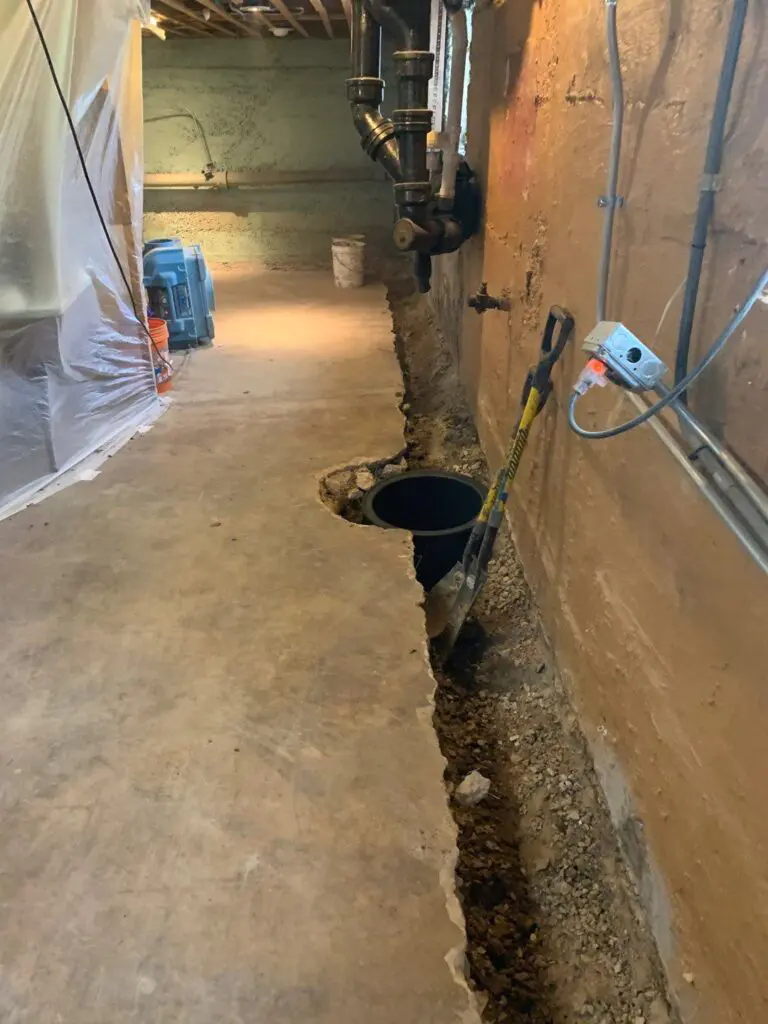Imagine this: you’re settling into your cozy basement, ready to enjoy a movie night, when you notice a damp patch on the floor. It’s a small, unassuming spot, barely noticeable at first, but as you get closer, a chill creeps up your spine. Could this be the start of a bigger problem? Is water actually coming up from beneath your concrete basement floor? The thought sends shivers down your spine, bringing visions of mold, structural damage, and flooded rooms.

Image: cinvex.us
This is a common concern for homeowners, especially those with basements. The truth is, water can come up through your basement floor, and the reason isn’t always obvious. We’re going to delve into the reasons why this happens, the telltale signs to watch out for, and most importantly, how you can prevent it.
Why Does Water Rise Through Concrete?
To understand how water can seep upwards, we need to understand the characteristics of concrete and its interaction with water.
- Concrete is porous: While it seems solid, concrete is actually quite porous. Imagine a sponge, with microscopic holes throughout. This allows water to permeate its structure, especially if the concrete is cracked or damaged.
- Hydrostatic pressure: This refers to the pressure exerted by a fluid due to gravity. Imagine a swimming pool. The water at the bottom of the pool experiences greater pressure than the water at the surface. The same principle applies to groundwater, which exerts pressure on the concrete beneath your basement floor.
- Capillary action: This is the ability of water to travel upwards through narrow spaces, defying gravity. Think of a paper towel absorbing water. The same principle applies to the tiny pores in concrete, allowing water to rise from the soil beneath.
Common Causes of Water Rising Through a Concrete Basement Floor
- Cracked concrete: Cracks in your basement floor act as pathways for water to seep through from the ground below.
- Poor drainage: If the soil around your foundation isn’t properly graded, water can collect against the walls and seep into your basement. This is especially true in areas with heavy rainfall.
- Leaky pipes: Leaky water pipes can contribute to damp basement floors, sometimes even causing a rise in water levels.
- High groundwater table: If the groundwater level is high, the pressure exerted on the concrete can force water upwards.
- Neglecting the foundation: Not properly sealing cracks or gaps around the foundation can allow water to enter your basement, leading to rising dampness.
Signs That Water Is Rising Through Your Basement Floor
Detecting water seepage early is key to preventing serious damage. Here are some signs to watch out for:
- Visible damp patches: This is the most obvious sign of water coming up through the floor.
- Mold and mildew growth: Mold thrives in damp conditions, so its presence is a red flag.
- Musty smell: A damp musty smell in the basement is another indication of moisture problems.
- Efflorescence: This is a white, powdery substance that forms on concrete surfaces as water evaporates.
- Cracking or peeling paint: Water damage can lead to paint peeling and cracks in the basement walls.
- Spalling concrete: If you see pieces of concrete chipping away, it could be due to water damage.

Image: viewfloor.co
Preventing Water From Rising Through Your Basement Floor
- Address cracks: Seal any cracks in your basement floor and foundation walls with a concrete patch or sealant.
- Improve drainage: Make sure the soil around your foundation slopes away from the house to prevent water buildup.
- Check and repair pipes: Regularly inspect your pipes for leaks and rectify any issues promptly.
- Install a sump pump: A sump pump is a vital tool for removing water that accumulates in the basement.
- Consider a waterproof membrane: A waterproof membrane can be applied to the basement floor before pouring concrete, creating a barrier against moisture intrusion.
Expert Insights for Homeowners
Here’s what professionals recommend:
- Regular inspections: Have a licensed contractor inspect your basement foundation regularly to identify any potential water problems before they become serious.
- Don’t delay: If you suspect water seepage, contact a qualified contractor as soon as possible to diagnose the issue and implement a solution.
Can Water Come Up Through Concrete Basement Floor
Taking Action to Prevent Basement Water Problems
As homeowners, we have a responsibility to protect our homes. By understanding the causes of water rising through concrete floors, knowing the signs to watch out for, and taking proactive steps to prevent it, we can safeguard our investments and create a healthy living space for ourselves and our families.
If you notice any signs of water seepage, don’t wait to address the problem. A timely intervention can save you from costly repairs and potential health hazards.






